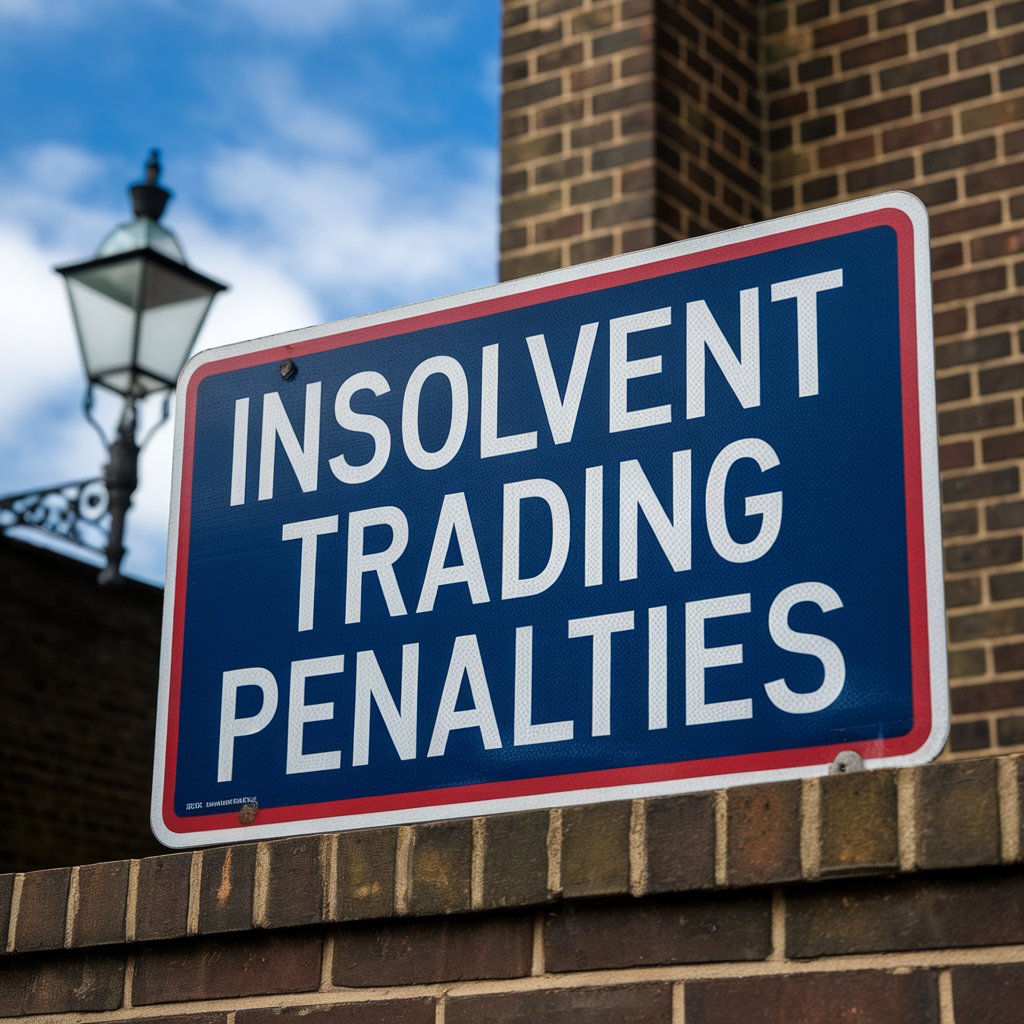What Happens When You Hire an Insolvency Practitioner Many UK directors and business owners face stressful financial problems—ranging from mounting debts to the risk of compulsory liquidation. When these challenges surface, seeking professional support can be the turning point. Hiring an insolvency practitioner UK for your company brings legal protection, business rescue opportunities in the […]
Insolvent Trading Penalties: Key Facts for UK Directors
Insolvent trading can trigger severe repercussions for UK directors, including personal liability and possible disqualification. When a business is unable to pay debts and continues to trade without a reasonable prospect of avoiding insolvency, the law may classify this as wrongful trading. The Insolvency Act 1986, alongside related legislation, outlines civil and criminal penalties for insolvent trading, underscoring the seriousness of directors’ duties in insolvency. Even in challenging financial circumstances, directors must swiftly assess cash flow insolvency tests and act responsibly to protect creditors. Failure to do so places them at risk of personal fines or, in extreme cases, imprisonment. Securing expert guidance early is crucial to avoiding unnecessary liabilities and ensuring compliance with UK regulations. Trading whilst insolvent arises when directors knowingly operate a company that lacks the means to meet its financial obligations. Under UK law, this conduct may breach directorial responsibility, as there is no “reasonable prospect of avoiding insolvency”. Licensed insolvency practitioners play a key role in advising directors on their options, helping assess whether trading can continue safely or if formal measures are required. Wrongful trading penalties stem from section 214 of the Insolvency Act 1986, which holds directors accountable where ongoing trading worsens creditors’ positions. Though not always criminal, certain cases of insolvent trading—particularly where fraudulent intent is involved—can lead to criminal charges. Being aware of these distinctions is critical to avoiding more severe consequences, including lengthy director disqualification. Early identification of financial distress is essential. Indicators include persistent negative cash flow, repeated loan rejections, and escalating creditor demands. Recognising warning signals of company insolvency allows directors to intervene before the company enters wrongful trading territory. Directors who disregard these red flags risk sliding into wrongful trading territory: Illustrates whether a company can pay debts as they fall due. If suppliers remain unpaid and bank overdrafts cease to be extended, it suggests the firm may lack solvency. Trading whilst insolvent definition often hinges on this test, placing directors on notice if they continue to incur debts despite the inability to repay. Refers to directors aware their venture cannot remain solvent but still amass more liabilities, hoping for a turnaround. Courts consider whether they took practical measures, such as seeking professional advice or attempting to restructure. Directorial negligence in failing to act promptly often leads to a breach of directorial responsibility. The phrase “What are the penalties for trading insolvent?” often arises when directors realise they may have delayed addressing insolvency. Penalties for trading whilst insolvent can be substantial and encompass multiple forms: Many directors initially face civil liability, particularly if creditors suffer additional losses due to their actions. The court can impose compensation orders, requiring repayment to the insolvent estate. More severe wrongdoing, including hiding company records or issuing false financial statements, can constitute fraudulent trading—increasing the likelihood of criminal prosecution, fines, or even imprisonment. Section 214 of the Insolvency Act 1986 empowers courts to assign personal liability. Wrongful trading penalties vary, but directors can be compelled to contribute personally to the debts incurred once they knew—or should have known—that insolvency was unavoidable. This is distinct from fraudulent trading UK law, which targets deliberate intent to defraud creditors, often carrying harsher punishments. Directors ignoring “trading whilst insolvent definition” risk far-reaching repercussions: Courts can disqualify individuals from acting as directors if found guilty of insolvent trading. Disqualification periods range from two to 15 years, restricting future business pursuits. This measure protects the public, enforcing accountability for breach of directorial responsibility and preventing repeated misconduct. A director’s personal assets can be targeted if a compensation order is granted. In extreme scenarios, they may lose homes or savings to repay company creditors. The threat of personal liability for debts highlights the seriousness of insolvent trading penalties, further underscoring the consequence of ignoring early warning signs. Real-world instances help clarify how trading insolvent penalties manifest: A company with unsustainable overheads, consistently missed supplier payments, and a constant reliance on expired overdraft facilities continues to trade hopefully. Directors neglect repeated creditor demands until a winding-up petition is filed. Investigations reveal that they had no “reasonable prospect of avoiding insolvency,” prompting wrongful trading allegations. The subsequent ruling results in personal contributions toward the shortfall faced by creditors and director disqualification. Fraudulent trading involves deliberate deception or attempts to defraud creditors, such as falsifying invoices or hiding liabilities. Wrongful trading penalties often hinge on negligence or failure to act responsibly, which is a civil offence, not criminal offence. Both incur severe outcomes but hinge on directors’ knowledge, intent, and proactive steps—or lack thereof—to mitigate losses. Mitigating or preventing “directors penalty for trading whilst insolvent” requires attuned financial oversight and expert intervention: Directors should monitor the company’s balance sheets routinely, watching for signals of financial distress. Seeking insolvency practitioner input can uncover possible recovery strategies, including company voluntary arrangements or administration. Demonstrating openness to solutions protects directors against claims they “knowingly traded insolvent.” Prompt action is vital to showing the court that every step was taken to prevent more creditor losses. The priority must shift from shareholder returns to creditor interests once insolvency looms. Adhering to a formal recovery plan or ceasing to trade if no reasonable turnaround is feasible diminishes the scope for costly civil and criminal penalties for insolvent trading. A transparent, well-documented track record of attempts to address liabilities goes a long way in mitigating potential liability—especially under wrongful trading Insolvency Act 1986 provisions. Professional insolvency guidance ensures directors remain aligned with UK regulations, further safeguarding against trading insolvent penalties. Nexus Corporate Solutions provides comprehensive assessments to ascertain if insolvency is imminent and advises on halting or restructuring operations responsibly. Their expertise in evaluating liabilities, negotiating with creditors, and planning viable rescue routes helps de-escalate the risk of wrongful trading claims. Directors who consult early can minimise the likelihood of personal liability and disqualification, preserving both corporate and personal reputations. Insolvent trading in the UK carries significant ramifications for directors, encompassing civil and, in extreme cases, criminal penalties. Ignoring clear signs of impending insolvency and continuing to rack up liabilities places directors at risk of fines, compensation orders, or disqualification. While wrongful and fraudulent trading differ in legal thresholds, both require careful, timely action to avert damaging outcomes. The best defence is identifying potential insolvency early and seeking professional support. Nexus Corporate Solutions is equipped to guide directors through these complex waters, ensuring disciplines are maintained and creditor interests safeguarded.Trading Whilst Insolvent: Definition and Legal Context

Common Warning Signs Leading to Insolvent Trading
Cash Flow Insolvency Test
Directors Knowingly Trade Insolvent
Overview of Trading Insolvent Penalties UK
Civil and Criminal Penalties for Insolvent Trading
Wrongful Trading Penalties

Possible Consequences for Directors
Directors’ Disqualification UK
Personal Liability for Debts
Examples of Insolvent Trading in Practice
Example of Insolvent Trading
Fraudulent vs. Wrongful Trading
Avoiding Trading While Insolvent Penalty
Prompt Action and Professional Advice
Fulfilling Directors’ Duties in Insolvency

Role of Nexus Corporate Solutions
Conclusion
How Are Insolvency Practitioners Appointed – UK Expert Guide Navigating financial turmoil can be overwhelming for company directors and sole traders alike. Faced with mounting debts, threats of compulsory liquidation, or creditor demands, knowing “how insolvency practitioners are appointed” becomes crucial for preserving your organisation. In the UK, professional insolvency services, such as company voluntary […]
Administration might be your lifeline when your company's drowning in debt and creditors are circling. But here's what most directors don't understand: it's not just about buying time — it's about buying the right kind of time, with the proper professional support. The difference between administration working for you or against you often comes down […]
Can an Insolvency Practitioner Stop Creditors? In the UK, mounting pressure from creditors can disrupt cash flow, increase stress for directors, and push a company toward insolvency. Professional guidance plays a pivotal role in countering these challenges. Nexus Corporate Solutions Limited specialises in helping businesses find relief from persistent creditors, providing strategic solutions that align […]
When your company's in financial trouble, one of the biggest worries is what happens to everything you've built. Your equipment, property, stock — the assets that represent years of hard work. It's a valid concern, and you're not alone. The reality? How insolvency practitioners handle your company's assets can make or break the outcome for […]
Insolvent trading can trigger severe repercussions for UK directors, including personal liability and possible disqualification. When a business is unable to pay debts and continues to trade without a reasonable prospect of avoiding insolvency, the law may classify this as wrongful trading. The Insolvency Act 1986, alongside related legislation, outlines civil and criminal penalties for […]
Recognising the signs of business insolvency early is vital for UK companies. Overlooked warning signals—such as recurring cash flow issues, unpaid HMRC tax arrears, or missed staff wages—can quickly escalate into serious risks that demand immediate attention. Being aware of these common signs of business insolvency enables directors to take timely action, whether through careful […]
Supplier insolvency can have serious consequences for UK companies, creating ripple effects that extend beyond the affected supplier. Cash flow interruptions, delayed payments, and increased operational risks are common outcomes. When a key supplier or client becomes insolvent, contracts may be disrupted, insurance coverage can be affected, and overall profitability may decline. Nexus Corporate Solutions […]
Struggling with IVA monthly payments can feel overwhelming, especially when daily financial obligations pile up. An Individual Voluntary Arrangement (IVA) is designed to help those in debt regain stability by consolidating and managing repayments under a legally binding agreement. However, life changes—like reduced monthly income, sudden expenses, or shifts in personal circumstances—often make sticking to […]
Experiencing financial difficulty can make everyday life more challenging, especially when an individual or business director needs to secure a stable living arrangement. In the UK, an Individual Voluntary Arrangement (IVA) offers a legally binding debt solution that eases pressure from creditors. However, many worry about problems renting after IVA. Questions about how this might […]

Address: Apex Building, 1 Water Vole Way, Balby, Doncaster, South Yorkshire, DN4 5JP
Tel: 01302 430180
Services
Company


